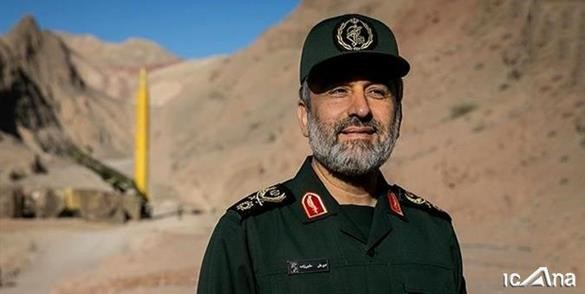Iran: Contradictory policies portray a desperate regime

Following the Iranian regime’s claims on October 11 regarding one of its oil tankers being hit by “missiles” while sailing in the Red Sea 60 miles off the coast of Jeddah, Saudi Arabia, to this day we have witnessed a variety of contradiction’s in Tehran’s regional policy.
Known for its practice of blackmailing the international community, the mullahs have a dire necessity to export crises. Recent examples include attacking oil tankers in regional waters and the cruise missile/drone attack against Saudi Arabia’s Aramco oil facilities. On the other hand, deeply concerned about regional isolation, various Iranian regime officials play the victim game and claim to seek peace.
Hajizadeh had played a vital role in the Sept14, 2019 drone &cruise-missile attack against #SaudiArabia’s ARAMCO facilities deep inside Saudi territory, according to information revealed on September 30 by the #NCRI’s US office in Washington DC ncr-iran.org/en/news/terror… #FreeIran
66 people are talking about this
The mullahs are appealing that two missiles targeted their SABITI oil tanker in the Red Sea. Ali Shamkhani, Secretary of the regime’s Supreme National Security Council, made specific remarks on October 12, threatening to take retaliatory action. His words are important due to the fact that Shamkhani is the de facto representative of Iranian regime Supreme Leader Ali Khamenei in the Council.
“This attack will not go unanswered and a special committee has launched its work to evaluate the matter and the result will be provided to decision-making officials soon,” Shamkhani said without pointing fingers at any particular parties. “After evaluating the existing video footage and collected evidence, we have obtained significant links to those behind these adventurous measures… In recent months, other destructive measures targeted the Happiness and Helm oil tankers in the Red Sea,” he added, according to the Tasnim news agency, affiliated to the Revolutionary Guards (IRGC) Quds Force.
Aladdin Borujerdi, a member of the Security Commission in Iran’s Majlis (parliament), also resorted to threats. “This incident can render threats against all oil tankers in the open seas,” he said, according to the state-run Resalat daily.
On the other hand, the state-run Siasat-e Rooz daily, affiliated to Khamenei’s faction, wrote a piece on Saturday, October 12, specifically placing the crosshairs on various regional countries.
“This probability has now become all but certain that Saudi Arabia and Israel are linked to this missile attack… In that region of the Red Sea, the Saudis and Israelis are present in coordination with the U.S. Considering its enmity against the Islamic republic…, one cannot neglect the role of the Saudis in this attack,” the article reads.
While Tehran claims to seek a policy of decreasing tensions with Saudi Arabia, the wording of this article, reflecting the viewpoints of decision-makers in the Iranian regime, appear otherwise.
“Considering the current circumstances, the Islamic Republic of Iran will deliver an adequate response to the Saudi regime. There is no doubt that Iran will respond to such an attack. The Saudis should be prepared for a harsh response from Iran following proof of Riyadh’s role in this attack,” the piece concludes.
Hassan Hanizadeh, a regime insider described as an expert by state media, resorted to utter hypocrisy in defining a precondition for Saudi Arabia prior to any “peace negotiations.”
“First of all, Saudi Arabia must end it's military’s aggression in Yemen and refrain from meddling in the internal affairs of countries such as Syria and Iraq in order to enter negotiations with [Iran],” he said.
In further contrast to claims made by Iranian regime Foreign Minister Mohammad Javad Zarif over negotiations with Saudi Arabia, Mohsen Roohi-sefat, a former diplomat, emphasized on Tehran continuing its expansionist policies. “There are no changes in Iran’s position and there is no need for change,” he stressed.
This contradictory line is also witnessed in circles and outlets close to the faction of Iranian regime President Hassan Rouhani over the SABITI oil tanker and talks with Saudi Arabia.
“It is crystal clear that one side of these tensions, as in previous cases, is Tehran facing Riyadh along with its subordinates, meaning Doha and Bahrain. Of course, Riyadh and members of their coalition are not alone in instigating this and similar cases of tension. They consider themselves in debt to the support of a party outside of the Persian Gulf region, being Washington,” the state-run Jahan-e Sanat daily article reads in reference to the complex status quo.
The piece concludes, “It appears that this incident is a part of a process involving pressure diplomacy led by Riyadh in pursuit of Washington’s interests in possible negotiations. In fact, Washington’s objective is persuading Tehran back to the negotiating table through a trend of diplomatic pressure.”
On the other hand, Fereydoon Majlesi, a former Iranian regime diplomat close to the Rouhani faction, welcomed a recent visit by Pakistani Prime Minister Imran Khan in hopes of a future easing of sanctions for Tehran.
“The mediation and intervention of Imran Khan are considered a positive turn of events. [Iran] faces a number of issues and dilemmas… and yet in the case of the missile attack targeting the Iranian oil tanker, no party has come forward to accept responsibility and there is no specific analysis available in this regard. Although there is a word in some circles that this missile was fired by Saudi Arabia, [Iran’s] Foreign Ministry says this is not true,” he said in a recent interview.
U.S. State Department Says Extra Deployment in #Saudi Is Against Attacks by #Iran ncr-iran.org/en/news/terror…@Maryam_Rajavi #FreeIran
38 people are talking about this
With international crises deepening the mullahs’ global isolation abroad and a powder keg society, seen recently in protests of Lordegan in southern Iran, reminding the mullahs’ of a very restive society at home, the regime ruling Iran is certainly facing an uphill battle. Contradictory remarks provide a window into the mullahs’ apparatus, with no long-term solution, resorting to any means possible in a desperate attempt to make ends meet.















No comments:
Post a Comment